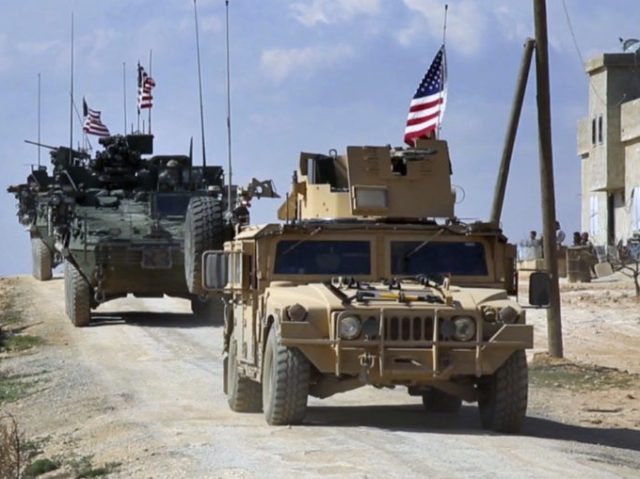Turkish Foreign Minister Mevlüt Çavuşoğlu told reporters this weekend that the United States had reached a “common understanding” with Turkey for a plan to expel its allies, the Syrian Kurdish People’s Protection Units (YPG/YPJ), from northern Manbij, Syria.
Turkish President Recep Tayyip Erdogan launched an invasion of northern Syria in January, targeting the Kurdish region of Afrin, west of Manbij. Turkish officials have insisted that they will enter Manbij and eradicate the YPG once Afrin is secured. The United States maintains a presence in Manbij, though not Afrin, and U.S. officials have insisted they will not move their troops if Turkey chooses to attack.
The United States and Turkey are NATO allies. The YPG is one of America’s most reliable allies on the ground against the Islamic State (ISIS) but has been forced to abandon the front lines against ISIS to defend itself against the Turkish military.
Çavuşoğlu said that the U.S. and Turkey had “established working groups” for discussing the removal of the Syrian Kurds from Manbij. The groups first met on Thursday, he noted, and the U.S. is currently deciding on a strategy to reduce tensions in the region for a meeting on March 19. Bas News, a Kurdish outlet, cited a Trump administration source speaking to the Washington Post in its report who stated that the U.S. “compromised on Manbij so that the Syrian Kurdish People’s Protection Units (YPG) will withdraw from the province in return for US presence at the Turkish Incirlik Air Base.”
That report contradicts a Wall Street Journal report that Washington is seeking to limit its presence at Incirlik. U.S. officials have stated that the Trump administration does not have an interest in reducing its presence at the airbase.
Çavuşoğlu insisted that “the YPG group will not have a presence in the local administration of Manbij, and the administration will operate according to the local population,” according to the Turkish newspaper Hurriyet. He added that if the United States successfully expels their allies from their territory, the two countries will implement this plan in Raqqa, the former capital of the Islamic State liberated by the YPG. If the U.S. fails, “a military operation will be carried out not only in Manbij, but also to the east of the Euphrates.”
The YPG has made clear it has no intention of allowing the Turkish military in Manbij, raising the question of whether the United States can convince the fighters to abandon their territory.
On Monday, YPG spokesperson Brusk Heseke told the outlet Kurdistan 24 that the YPG would not “allow” Turkish forces in Manbij.
“We will not allow Turkey to expand its offensive beyond Afrin, despite their threats and warnings to invade Manbij and Qamishlo,” Heseke said. “We have promised our people and martyrs that we will defend Afrin until the last drop of blood. We are a force that believes in freedom.”
Heseke added that forces belonging to Syrian dictator Bashar al-Assad are fighting alongside the Kurds in Afrin. Both Assad and Erdogan have repeatedly referred to each other as “terrorists.” Erdogan has said that Turkish troops are in Syria to “end the rule of the tyrant Assad” and “for no other reason.”
The YPG’s political wing, the Democratic Union Party (PYD), has urged the United States to remain loyal to its allies, who do not have ties to jihadists nor to the Assad regime, save for Assad’s troops joining the Kurds in the fight against Turkey last month.
“The international alliance against Daesh [ISIS], they are still there, and ethically they [the United States] should stand beside us. So we don’t know what will happen, what they will do if the Turks advance,” former PYD co-chair Salih Muslim told reporters this week. “We will resist for our part. We will resist against this invasion, these attacks, we will resist.”
While discussions with Turkey on moving the Kurds out of Kurdistan may remain ongoing, U.S. military leaders have made clear they have no intention of leaving Manbij themselves. In late January, U.S. Central Command chief Joseph Votel told CNN that leaving Manbij is “not something we are looking into.”
Another official, U.S. Lt. Gen. Paul E. Funk, told reporters that U.S. soldiers were in Manbij to “ensure the lasting defeat of ISIS is maintained in this area.”
“I’m very confident in the [Syrian Democratic Forces] leadership. When nobody else could do it they retook Raqqa. I think that has earned them a seat at the table,” Funk said in February.

COMMENTS
Please let us know if you're having issues with commenting.